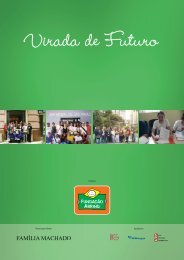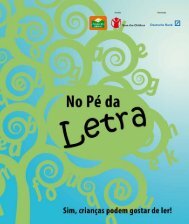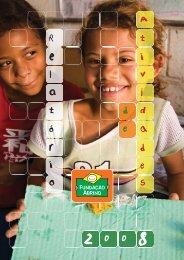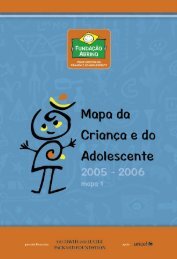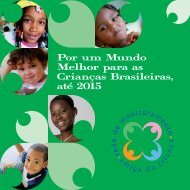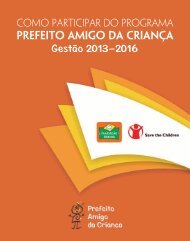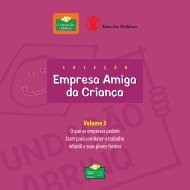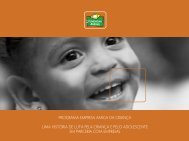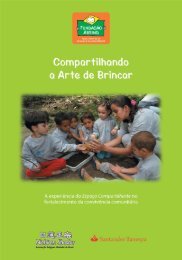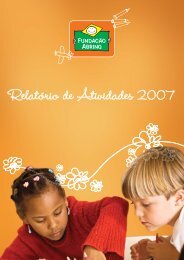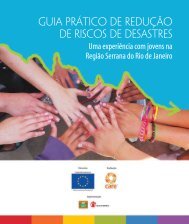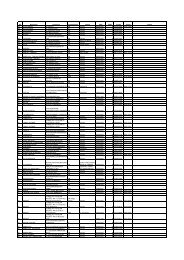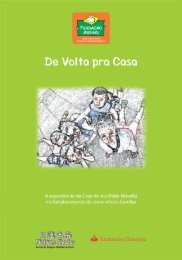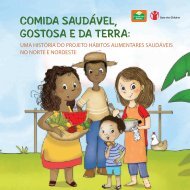One of the main fronts for this Campaign is the articulation for the inclusion of crèches inthe Fundo de Manutenção e Desenvolvimento da Educação Básica – Fundeb (Basic EducationMaintenance and Development Fund), via the “Fundeb pra Valer” movement, whichfights for the appropriate regulation of the fund. In <strong>2006</strong>, with a strong articulation inthe various spaces for participation in conjunction with the National Congress, the SpecialCommission of the House of Representatives, the National Counsel of Education Departments(Consed) and the National Union of Municipal Education Administrators (Undime),as well public audiences, marches and reports in the printed and spoken press, the movementcontributed to the perfecting of the Proposed Amendment to the Constitution thatcreated the Fundeb, guaranteeing the inclusion of crèches to the public funding system andan important expansion of the financial contribution from the Union to the fund.Education from early childhoodFundeb will have a span of 14 years counting from March 1st, 2007. The aim of the fund isto guarantee resources for all of the phases of Basic Education, with an investment of morethan R$ 45 billion following its fourth year of existence.With the Fundeb, the number of students attended will go from the approximately 32 millionfinanced by the Fundef to more than 47 million, given the inclusion of children aged from 0to 6 years (crèche and nursery), of the middle-school students from the municipal and stateschools and students from all forms of education (youth and adult education, special education,education for indigenous peoples, professional education and field education).Providing continuity to its historical participation in the fight for the eradication of child labor, the<strong>Abrinq</strong> Foundation carried out the Real Estate Sectorial Pact for the eradication of child labor inconjunction with construction companies, real estate agents and sales and promotion unions, inpartnership with the Comissão Extraordinária Permanente da Criança e do Adolescente (SpecialPermanent Commission for Children and Adolescents) the São Paulo Town Council, the MunicipalForum for the Rights of Children and Adolescents, the State Public Ministry of Labor and theRegional labor Office. It also participated in the discussion and articulation, together with theFórum Paulista de Erradicação do Trabalho Infantil (São Paulo Forum for the Eradication of ChildLabor), to combat child labor on the trains run by the CPTM rail transport company.In São Paulo, the <strong>Abrinq</strong> Foundation participated as a member of the Municipal Commissionfor the Eradication of Child Labor with a focus on the construction of actions fordealing with this problem in the municipality.In the context of the worst forms of child labor, the organization participated in the 1stForum for Discussion of “How to reduce informality in domestic employment”, held by theRotary Club of Rio de Janeiro - Saara, in partnership with the Public Ministry of Labor andthe Portal Doméstico Legal, at the Trade Association of Rio de Janeiro (ACRJ). The <strong>Abrinq</strong>Foundation presented data regarding the situation of domestic child labor in Brazil and theactions it develops to deal with the problem.With the intention of sharing the accumulated experience on this subject, the <strong>Abrinq</strong>Foundation participated as a lecturer at the seminar “Trabajo Infantil en América Latina yEl Caribe: Estratégias de prevención y eliminacion progresiva”, held by the Inter-AmericanDevelopment Bank in November of <strong>2006</strong>, in Lima, Peru. The aim of the seminar was toidentify strategic actions focused on the prevention and eradication of child labor in LatinAmérica and the Caribbean. The <strong>Abrinq</strong> Foundation participated in the panel on: “Alcancesde la participación de la empresa en la prevención del trabajo infantil”, with the presentationof actions aimed at the mobilization of companies in the forming of sectorial pactsto eradicate child labor. Besides this international event on the subject, the Foundationwas also present at the 1st Encontro Internacional Proniño de Educação e Erradicação doTrabalho Infantil, in Quito (Ecuador), where it presented its experience in the articulation ofcompanies to form sectorial pacts.Believing in the importance of mobilizing all of society in the fight against child labor, the<strong>Abrinq</strong> Foundation lent its support to the publication and launch of the Turma da Mônica:Toda Criança quer Ser Criança comic on the World Day for Combat Against Child Labor, inpartnership with the national Forum for the Prevention and Eradication of Child Labor– FNPETI (Fórum Nacional de Prevenção e Erradicação do Trabalho Infantil), the SantanderBanespa, Banesprev and Cabesp Group Staff Association - AFUBESP, the National Associationof Labor Magistrates - ANAMAT<strong>RA</strong> (Associação Nacional dos Magistrados doTrabalho), National Association of Labor Attorneys – ANPT (Associação Nacional dosProcuradores do Trabalho), Comitê Betinho de Funcionários do Santander Banespa and theBank and Financial Workers Union for São Paulo, Osasco and Region. 85,000 copies werepublished and the <strong>Abrinq</strong> Foundation distributed 10,000 copies via its networks.Allied with the International Labor Organization (ILO) in the fight against child labor, the<strong>Abrinq</strong> Foundation contributed to the Catavento Project, which seeks to prevent and eradicatethe worst forms of child labor in five Brazilian states – Maranhão, Paraíba, Rio Grandedo Sul, Rio de Janeiro and São Paulo. In <strong>2006</strong>, meetings were held with 111 companies inthese regions for training in the areas of corporate social responsibility, the Lei do Aprendizand first jobs within the context of the Empresa Amiga da Criança Program. The PrefeitoAmigo da Criança Program, in turn, acted in the mobilization of 18 municipalities of thestates that are the focus of the Catavento Project.The Prefeito Amigo da Criança Program also contributed to an initiative by the SocialResponsibility Committee of the Santander Banespa Bank that sought to identify municipalitieswith educational actions aimed at eradicating, minimizing and combating childlabor. The company, via donations to the Municipal Funds for the Rights of Children andAdolescents, focused its investments in this area.In the aim of dealing with abuse and sexual and commercial exploitation of children andadolescents, considered to be one of the worst forms of child labor, the <strong>Abrinq</strong> Foundationgave its support to the re-articulation and realization of the annual assembly of theMovimento Social Pacto São Paulo Contra a Violência, Abuso e Exploração Sexual Comercialin partnership with the Public Prosecution Service, the São Paulo Municipal Departmentfor Social Assistance and Development and Civilian Social Organizations.Also acting on other fronts in defense of the rights of children and adolescents, the Foundationparticipated in the mobilization and articulation for the eradication of physical andhumiliating punishment used against children and adolescents. To this end the followingactivities were carried out:66
Participation in the “Não Bata, Eduque” Network (Don’t Beat, Educate) as a memberof administration group along with Save the Children - Sweden, Andi, Comunicarte,the Parliamentary Front for the Rights of Children and Adolescents, the Xuxa MeneguelFoundation, the Proteger Project and the ProMundo Institute.Support for the drawing up of notes for the Bill to eradicate physical and humiliatingpunishments and the national campaign to deal with this problem.In the field of social-educational measures, the <strong>Abrinq</strong> Foundation participated in drawing upthe plan of action for the Inter-sectorial Committee for Municipalization of the Social-EducationalMeasures in Open Environments, coordinated by the São Paulo Municipal Departmentof Social Assistance and Development (SMADS) and by Febem-SP. This committee also has theparticipation of civilian social organizations responsible for carrying out social-educationalmeasures in open environments, the Polis Institute, Regional SAS and CMDCA.In the greater metropolitan region of São Paulo, together with the Movimento CriançaPrioridade 1, of the Greater ABC Inter-municipal Consortium, composed of the municipalitiesof São Bernardo do Campo, Santo André, Diadema, São Caetano do Sul, Rio Grandeda Serra, Ribeirão Pires and Mauá, the foundation contributed to the structuring of themonitoring and assessment project for carrying out the social-educational measures, whichshould be finalized in 2007.Alongside the Ministry of Labor, the Department of Public Policy for Employment, Petrobras,the Roberto Marinho Foundation, the Pão de Açúcar Institute, the Ethos Institute, theGol de Letra Foundation and the Associação de Franquias Solidárias, among other organizations,<strong>Abrinq</strong> participated actively in the discussion on the continuity of the mobilizationactions for the campaign aimed at regulating the Lei do Aprendiz.Aware of the how important social articulation is for the control and monitoring of publicpolicies, the <strong>Abrinq</strong> Foundation believes in networking. This being so, to assure the monitoringand assessment of the commitments assumed by the president elect when he signedthe “Termo de Compromisso Presidente Amigo da Criança”, the Amiga da CriançaMonitoring Network was created, composed of non-governmental organizations multilateralbodies that act in the field of childhood and adolescence. The Network is supportedby the United Nations International Children’s Emergency Fund (Unicef), the InternationalLabor Organization (ILO) and Save The Children/UK.During the year of <strong>2006</strong>, the Monitoring Network mobilized itself to produce the II Reporton the monitoring of the commitments assumed by the Brazilian State in the document“Um Mundo para as Crianças (MPC)” and by the Lula administration, in the PresidenteAmigo da Criança e do Adolescente Plan.The main emphasis of this report is to take a look at what has been done in the last fewyears and how the variables have behaved in relation to the goals and commitments.Its central aim is to extract useful recommendations, based on empiric evidence, that contribute toimproving the policies for childhood and adolescence in Brazil, in the understanding that the commitmentassumed by Brazil before the United Nations Organization are not exclusive to the Unionor to the Federal Government, but to the Brazilian State – on its three levels – and to society.Organizations that comprise the Amiga da Criança Monitoring NetworkAção EducativaÁgere Cooperação em AdvocacyAgência de Notícias dos Direitos da Infância - ANDIAldeias Infantis SOSAPAE de São PauloAssociação de Voluntários para o Serviço Internacional – AVSICampanha Nacional pelo Direito à EducaçãoCentro de Referência, Estudos e Ações Sobre Crianças e Adolescentes – CECRIACentro de Recuperação e Educação Nutricional – CRENCidadania, Estudo, Pesquisa, Informação e Ação – CEPIACIPÓ – Comunicação InterativaComitê Nacional de Enfrentamento à Violência Sexual contra Crianças e AdolescentesComunidade Baha´iEcos – Comunicação e SexualidadeFórum Nacional de Prevenção e Erradicação do Trabalho Infantil - FNPETI<strong>Fundação</strong> ABRINQ pelos Direitos das Crianças e dos Adolescentes<strong>Fundação</strong> OrsaFundo das Nações Unidas para a Infância e a Adolescência – UNICEF.Grupo de Apoio à Prevenção à Aids - GAPA – BAInstituto ÂmbarInstituto Brasileiro de Administração para o desenvolvimento - IB<strong>RA</strong>DInstituto de Estudos Socioeconômicos - INESCInstituto Ethos de responsabilidade SocialInstituto Latino Americano das Nações Unidas para a Prevenção do Delito e Tratamento dodelinquente - ILANUDInstituto PromundoInstituto Sou da PazInstituto Telemig CelularMissão CriançaMovimento Interfóruns de Educação Infantil do Brasil – MIEIBRede Sou de AtitudeOrganização Internacional do Trabalho – OITOrganização das Nações Unidas para a Educação, a Ciência e a Cultura – UNESCOPlan Internacional BrasilPólis – Instituto de Estudo, Formação e Assessoria em Políticas SociaisPrograma das Nações Unidas para o Desenvolvimento – PNUDSave the Children - UKSociedade Brasileira de PediatriaVisão MundialViva RioAWARENESS OF B<strong>RA</strong>ZILIAN REALITY IN RELATION TO THE RIGHTSOF CHILDREN AND ADOLESCENTSBrazil’s regional diversity leads to a necessary adaptation of all political and social actions. In acountry like Brazil, it is not possible to act using standardized solutions for the social problems.Also, some aspects of Brazilian reality are still fairly unknown due to the lack of data andtherefore they are often not be considered in their full complexity and importance by thepublic administrators when they are drawing up their social policies, programs and actions.The identification of such problems and their specifics, as well as the later construction ofproposals for intervention, requires the constant production of knowledge regarding thereality and the rights of Brazil’s children.67



